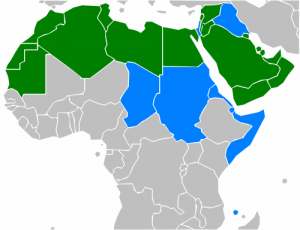Arabic Language
Oct 04
Question – Is it possible to practice Islam without knowing Arabic?
People who speak Arabic as their primary language make up fewer than 20% of the Muslim population worldwide. The adjacent map shows, in green, places around the world where Arabic is spoken as the primary language. A person is regarded as an Arab if they meet one of the following three criteria:
- Someone who can trace their ancestry to the tribes of Arabia (the Arabian Peninsula).
- Someone who speaks Arabic as their primary language.
- Any person who is a citizen of a country where Arabic is the national language.
Although the words Arab and Muslim are often used interchangeably they do not mean the same thing. Many Arabs are not Muslims and most Muslims are not Arabs.
Given that Islam originated in Arabia at a time when history was being meticulously recorded allowed Arabic to be infused into many of the ritual practices of Islam. The fact that the Quran was revealed in Arabic and it has been preserved till date in the language of its revelation affords the language of Arabic a special role in Muslim communities.
Certain religious rituals, such as prayers, require some of the utterances be made in Arabic. This is no different than the practices in many Christian denominations which require prayers to be in Latin. Judaism also requires ritual prayers in Hebrew. Similarly, Eastern religions such as Hinduism also require certain religious rituals to be conducted in Sanskrit.
Many non-Arab Muslims make extreme effort to learn Arabic as this enhances their ability to access sacred texts without the need for any translations. Understanding Arabic allows Muslims to better appreciate the linguistic majesty of the Quran, which they view to be the final revelation from God.

